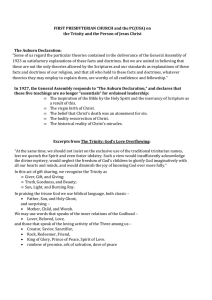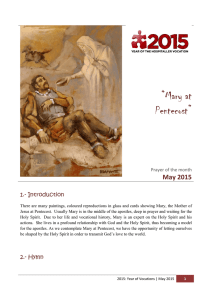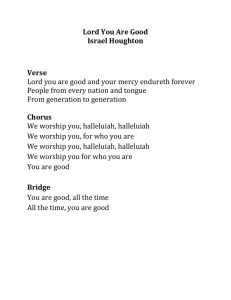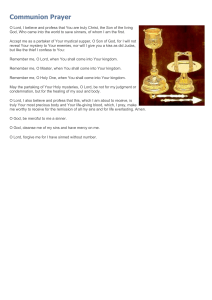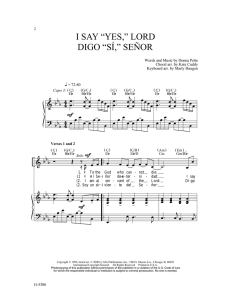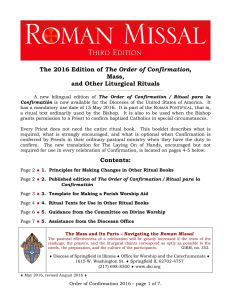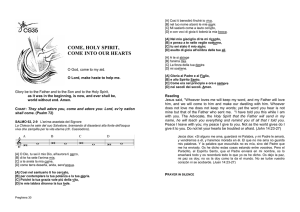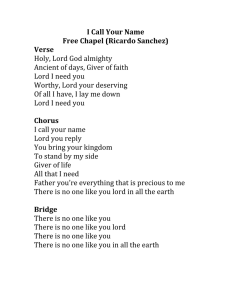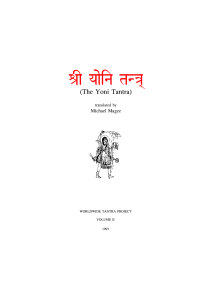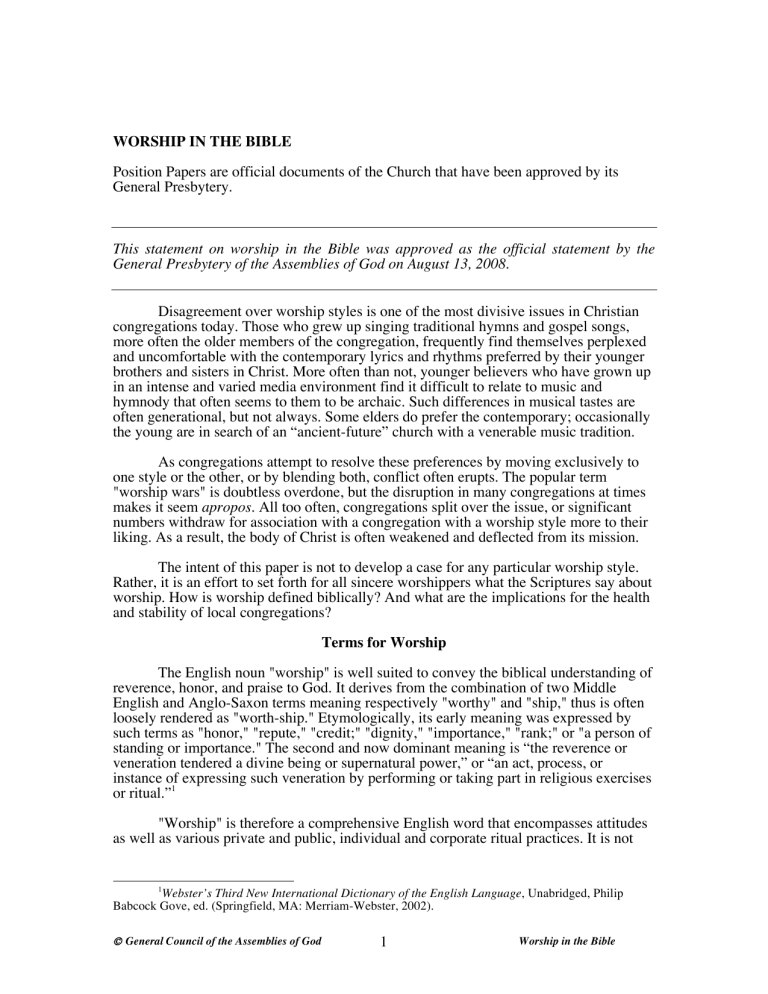
WORSHIP IN THE BIBLE Position Papers are official documents of the Church that have been approved by its General Presbytery. This statement on worship in the Bible was approved as the official statement by the General Presbytery of the Assemblies of God on August 13, 2008. Disagreement over worship styles is one of the most divisive issues in Christian congregations today. Those who grew up singing traditional hymns and gospel songs, more often the older members of the congregation, frequently find themselves perplexed and uncomfortable with the contemporary lyrics and rhythms preferred by their younger brothers and sisters in Christ. More often than not, younger believers who have grown up in an intense and varied media environment find it difficult to relate to music and hymnody that often seems to them to be archaic. Such differences in musical tastes are often generational, but not always. Some elders do prefer the contemporary; occasionally the young are in search of an “ancient-future” church with a venerable music tradition. As congregations attempt to resolve these preferences by moving exclusively to one style or the other, or by blending both, conflict often erupts. The popular term "worship wars" is doubtless overdone, but the disruption in many congregations at times makes it seem apropos. All too often, congregations split over the issue, or significant numbers withdraw for association with a congregation with a worship style more to their liking. As a result, the body of Christ is often weakened and deflected from its mission. The intent of this paper is not to develop a case for any particular worship style. Rather, it is an effort to set forth for all sincere worshippers what the Scriptures say about worship. How is worship defined biblically? And what are the implications for the health and stability of local congregations? Terms for Worship The English noun "worship" is well suited to convey the biblical understanding of reverence, honor, and praise to God. It derives from the combination of two Middle English and Anglo-Saxon terms meaning respectively "worthy" and "ship," thus is often loosely rendered as "worth-ship." Etymologically, its early meaning was expressed by such terms as "honor," "repute," "credit;" "dignity," "importance," "rank;" or "a person of standing or importance." The second and now dominant meaning is “the reverence or veneration tendered a divine being or supernatural power,” or “an act, process, or instance of expressing such veneration by performing or taking part in religious exercises or ritual.”1 "Worship" is therefore a comprehensive English word that encompasses attitudes as well as various private and public, individual and corporate ritual practices. It is not 1 Webster’s Third New International Dictionary of the English Language, Unabridged, Philip Babcock Gove, ed. (Springfield, MA: Merriam-Webster, 2002). General Council of the Assemblies of God 1 Worship in the Bible restricted to any particular part of a religious gathering, e.g. prayers, singing, musical performances, preaching, and so forth. Nor is it restricted to religious gatherings. Biblical theology, of course, must always be drawn, not from English, but from relevant Hebrew, Aramaic, and Greek words and concepts in the Old and New Testaments. In this case, the English word "worship" appears well-suited to describe the proper relationships of human beings to their Creator God as taught in Scripture. Nonetheless, the Christian understanding and practice of worship must first be shaped by study of the biblical text. Old Testament Terms for “Worship” While there are numerous Hebrew words for worship in the Old Testament, three are particularly significant.2 Hāwâ. The most significant is the verb hāwâ, which occurs 173 times and primarily means willingly “to bow down” to human beings, idols, or God. Describing a specifically religious act, the term occurs 110 times. For example, when Abraham rushed to meet his visitors in Genesis 18:2, he “bowed low to the ground.”3 With regard to pagan gods, Yahweh had commanded, “You shall not bow down to them or worship them; for I, the Lord your God, am a jealous God…” (Exodus 20:5). Nonetheless, disobedient Israelites as well as pagans worshipped idols. So, over one-half of the incidents of religious bowing down in the Old Testament are, in fact, to pagan deities. When King Amaziah of Judah defeated the Edomites, he confiscated their gods and promptly “set them up as his own gods, bowed down to them and burned sacrifices to them” (2 Chronicles 25:14). Proper worship for the God of Israel is found in such admonitions as Psalm 29:2: “Ascribe to the Lord the glory due his name; worship (hāwâ) the Lord in the splendor of his holiness,” and Psalm 95:6, “Come, let us bow down (hāwâ) in worship, let us kneel before the Lord our Maker.” True worship also includes praise. “Then David said to the whole assembly, ‘Praise the Lord your God.’ So they all praised the Lord, the God of their fathers; they bowed low and fell prostrate (hāwâ) before the Lord and the king” (1 Chronicles 29:20). Yārē’. The verb yārē’, found 317 times, may denote both terror toward humans or gods as well as awe and worship of the God of Israel. Thus Moses is commanded not to “be afraid (yārē’)” of Og, king of Bashan (Deuteronomy 3:2). However, Israel is to “fear (yārē’) the Lord your God, [and] serve him only…” (Deuteronomy 6:13). ‘Ābad. The verb ‘ābad, found 290 times, means essentially “to serve” and is used in both public and religious life. The concepts of serving God and worshipping Him tend to overlap. Thus in Exodus 3:12, “God said, ‘I will be with you. And this will be the sign to you that it is I who have sent you: When you have brought the people out of Egypt, you will worship (‘ābad ) God on this mountain.’ ” And in Malachi. 3:18: “You will again see the distinction between the righteous and the wicked, between those who serve (‘ābad) God and those who do not.” 2 For simplicity and consistency, the following Hebrew and Greek terms, their roots, transliterations, definitions, and statistics largely are drawn from the articles “Praise” and “Worship” in Mounce’s Complete Expository Dictionary of Old & New Testament Words, William D. Mounce, gen. ed. (Grand Rapids: Zondervan, 2006). 3 Unless otherwise indicated, biblical quotations are from the New International Version (NIV). General Council of the Assemblies of God 2 Worship in the Bible Old Testament Terms for “Praise” Words associated with “praise” are used about as often in the Old Testament as the words for “worship” above. Bārak. The verb bārak is found 327 times and is usually translated “to bless.” It has to do with people blessing others, God blessing His people, and people blessing God. When people “bless” God in the Psalms, the NIV usually translates it “praise” as in Psalms 63:4: “I will praise (bārak) you as long as I live, and in your name will I lift up my hands.” Halāl The verb halāl is used 146 times, most often in the Psalms, and means “to praise, boast, [or] exult,” and usually refers to praise of God, often in conjunction with music and singing. “I will praise (halāl) the Lord all my life; I will sing praise to my God as long as I live” (Psalms 146:2; cf. 149:1; 150). Yādâ. The verb yādâ, used 111 times, means “to praise, (give) thanks, [or] confess” as an acknowledgment of His person and work. The majority of references are found in the Psalms. For example, Psalms 106:1: “Praise (halāl) the Lord. Give thanks (yādâ) to the Lord, for he is good; his love endures forever” (cf. Psalms 107:1; 136:13,26). New Testament Terms for “Worship” The Greek New Testament relies on one basic word for “worship” but there are several others used occasionally. Proskyneō. Used 60 times, proskyneō is the key Greek verb for “to worship.” It means “to fall down and/or worship someone or something” and seems to have meant originally “to kiss” a deity (which would require falling down before or bending to the idol).4 Such worship is properly addressed only to God or Jesus. Thus, the man blind from birth, healed by Jesus, responded, “Lord, I believe,” and “he worshiped (proskyneō) him” (John 9:38). To be sure, proskyneō is sometimes used to denote reverence paid to humans, idols, demons, or Satan. But when worship is thus solicited (Revelation 9:20; 13:4,8,12), it is a usurpation of that which belongs rightly to God.5 Latreuō. The verb latreuō is used 21 times to denote religiously oriented service, whether to God or idols. In Stephen’s sermon, God said of captive Israel: “Afterward they will come out of that country [Egypt] and worship (latreuō) me in this place [Sinai]” (Acts 7:7; see also Hebrews 9:14; 12:22-28). Later, because of disobedience, God “gave [Israel] over to the worship (latreuō) of the heavenly bodies (Acts 7:42). Sebō. The verb sebō, also meaning “to worship,” is found 10 times in the New Testament; it includes the ideas of reverence and awe. One example is Matthew 15:9: “They worship (sebō) me in vain; their teachings are but rules taught by men.” Paul’s observation in Romans 1:25 utilizes both the preceding terms: “They exchanged the truth of God for a lie, and worshiped (sebō) and served (latreuō) created things rather than the Creator.” 4 Proskyneō, In The New International Dictionary of New Testament Theology, Vol. 2, Colin Brown, gen. ed. (Grand Rapids: Zondervan, 1976), 876. 5 Ibid., 877. General Council of the Assemblies of God 3 Worship in the Bible Worship in the New Testament In New Testament teaching, worship clearly is to be directed only to God, meaning the Triune God. When tempted by the evil one, Jesus emphatically declared the exclusivity of Christian worship, “ ‘Worship (proskyneō) the Lord your God, and serve (latreuō) him only’ ” (Matthew 4:10). Jesus is worshipped as God. The nature of worship is perhaps best described in the words of Jesus as He addressed the wayward Samaritan woman: “Yet a time is coming and has now come when the true worshipers will worship (proskyneō) the Father in spirit and truth (en pneumati kai aletheią), for they are the kind of worshipers the Father seeks. God is spirit, and his worshipers must worship in spirit and in truth (en pneumati kai alētheią)” (John 4:23,24). Translators frequently have rendered “spirit” with a lower case “s,” as in NIV. This interpretation identifies “spirit” as the human spirit and thus calls human worshippers to sincerity and a right attitude. However, John appears deliberately to have drawn together the terms "spirit" and "truth" so as to mean, in effect, “Spirit of truth.” Exegetes assert that such an understanding better suits the grammar and immediate flow of thought, as well the larger context of John’s teaching on the Spirit (1:32f.; 3:5-8,34; 6:63; 7:39; 11:33; 13:21; 14:17,26; 15:26; 16:13; 20:22; and the Paraclete, 14:16,26; 15:26; 16:7).6 Thus, Jesus is saying that believers can truly worship only with the help of the Spirit of truth who sanctifies and illuminates them by means of the truth of God’s Word—the truth about God and the truth about humans, their sin and salvation. “In true worship there is an encounter with God for which God must make man capable by His grace.”7 In view of the above, Paul’s comment seems particularly apt: “For it is we who are the circumcision, we who worship (latreuō) by the Spirit of God, who glory in Christ Jesus, and who put no confidence in the flesh…” (Philippians 3:3). It should be noted, however, that worship is often usurped by Satan as in the temptation of Jesus, “ ‘All this I will give you…if you will bow down and worship (proskyneō) me’ ” (Matthew 4:9). Speaking of the Antichrist and the Great Tribulation, Paul wrote, “He will oppose and will exalt himself over everything that is called God or is worshiped (sebasma), so that he sets himself up in God's temple, proclaiming himself to be God” (2 Thessalonians 2:4). Of this same time, John in the Revelation observed, “Men worshiped (proskyneō) the dragon because he had given authority to the beast, and they also worshiped (proskyneō) the beast and asked, ‘Who is like the beast? Who can make war against him?’ ” (13:4; cf. vv.8,12). Even after the Great Tribulation judgments of the seals and trumpets, surviving humans “did not stop worshiping (proskyneō) demons, and idols of gold, silver, bronze, stone and wood—idols that cannot see or hear or walk” (Revelation 9:20). Worship As Lifestyle While the focus of this paper is on the nature of worship in the gathered Christian community, worship is to be much more pervasive. The Samaritan woman to whom Jesus spoke was fixated on places of worship. Jesus told her the time would come when neither 6 See Raymond E. Brown, The Gospel According to John (i-xii); The Anchor Bible (Garden City, NY: Doubleday & Company, 1966), 180; also C. Brown, New International Dictionary, 2:878. 7 C. Brown, Ibid. The quotation is from R. Schnackenburg, The Gospel According to St. John, I (New York: Herder & Herder, 1968), 437. General Council of the Assemblies of God 4 Worship in the Bible the Samaritan holy place, Mount Gerizim, nor the Jewish temple in Jerusalem would be significant. What is important, He said, is that “true worshipers…worship the Father in spirit and truth” (John 4:21,24), requiring neither buildings nor rites. Paul urged the Romans “to offer your bodies as living sacrifices (thysia), holy and pleasing to God—this is your spiritual act of worship (latreia; from the verb latreuo)” (Romans 12:1). Paul used the language of the tabernacle/temple sacrifices and services to communicate that worship of God is properly a constant, living reality in every dimension of the believer’s life. Worship must pervade a person’s heart in daily living before it can be properly expressed in public. Music and Song in Worship Music and musical instruments appear near the beginning of the biblical record. As early as Genesis 4:21, Jubal is mentioned as the “father of all who play the harp and flute.” The Old Testament mentions 16 or more musical instruments in both worship and non-worship settings. The New Testament mentions four (or five if the “gong”of 1 Corinthians 13:1 is included). The Creator himself declared, “The morning stars sang together and all the angels shouted for joy” at the dawn of creation (Job 38:7). David, “Israel’s singer of songs” (2 Samuel 23:1), said, “He [the Lord] put a new song in my mouth, a hymn of praise to our God” (Psalms 40:3). And Isaiah prophesied, “You will go out in joy and be led forth in peace; the mountains and hills will burst into song before you, and all the trees of the field will clap their hands” (Isaiah 55:12). Organized music and choirs developed rapidly in David’s time, given his personal musical genius and his reverence toward the ark and the tabernacle/temple as God’s dwelling. David appointed Levites as “singers to sing joyful songs, accompanied by musical instruments: lyres, harps, and cymbals” (1 Chronicles 15:16-22; cf. 2 Chronicles 29:25,26; 35:15). “Four thousand are to be gatekeepers and four thousand are to praise the Lord with the musical instruments I have provided for that purpose” (1 Chronicles 23:5; cf. 2 Chron. 5:12,13). In fact, the word "psalm" (psalmos, from psallō, originally “to pluck” or “to play”) itself implies use of musical instruments. Interrupted by the Exile, Israel’s musical tradition resumed following her return from captivity, the rebuilding of Jerusalem, and the completion of the second temple (cf. Nehemiah 7:1; 12:27). Though there is little information in the Gospels and Acts, Jesus, the Apostles, and the believers of the Early Church would have been the beneficiaries of the musical ministries of the organized choirs and musicians of the temple. While the New Testament says nothing about musical instruments per se in the early Christian house churches, music and song were a part of Spirit-filled worship (Acts 16:25; 1 Corinthians 14:14,15,26; Ephesians 5:19; Colossians 3:16). Apparently there was a variety of styles and content in the congregational singing, though there is no evidence of church choirs or special numbers. The convictions of certain denominations against musical instruments notwithstanding, the New Testament does not prohibit any kind of musical instrument. In fact, Revelation depicts repeated scenes of heavenly worship featuring musical instruments and songs, as well as verbal celebration of the glory and power of God. The worshipping throng of Revelation 5, some with harp in hand, climaxed their songs to God and the Lamb with “praise and honor and glory and power, forever and ever!” (Revelation 5:13). The 144,000 sang to the Lamb “a new song before the throne and before the four living creatures and the elders” (Revelation 14:3). Those who overcame the beast “held harps given them by God and sang the song of Moses the servant of God and the song of the Lamb: ‘Great and marvelous are your deeds, Lord God Almighty’ ” General Council of the Assemblies of God 5 Worship in the Bible (Revelation 15:3). The vision of the Lord descending in power and glory is also prefaced by shouts of worship and praise (Revelation 19:1-8). The final word of the angel in that setting is, “Worship God! For the testimony of Jesus is the spirit of prophecy” (Revelation 19:10). While particular aptitude in the music arts is not specifically mentioned among the spiritual gift lists of the New Testament (cf. Romans 12:6-8; 1 Corinthians 12:810,28; Ephesians 4:11; 1 Peter 4:10,11), remember that these lists are probably ad hoc and noncomprehensive. Just as God by His Spirit specifically gifted Bezalel and Oholiab for the artistry of the tabernacle and its furnishings (Exodus 35:30-35)—another gifting not mentioned in the New Testament—it seems evident that He gifted David (2 Samuel 23:1; Psalms 40:3) for music and psalms and continues similarly to gift yielded believers. Places and Buildings in Worship Certain places and buildings, often appointed by God himself, have been utilized in worship by God’s people through the centuries. Abraham built altars and called upon the name of God as he journeyed through Canaan (Genesis 12:8; 26:25). God revealed himself to Jacob at Bethel whereupon Jacob set up and anointed a pillar of stone (Genesis 28:10-22). Jacob later returned to Bethel and built an altar there (Genesis 35:1). Upon meeting Moses at Sinai, God gave him a sign that, when the Israelites came out of Egypt, they would “worship God on this mountain” (Exodus 3:12). God had a particular place chosen in advance where He would enter into covenant with His chosen people. God himself gave Moses the plan for the tabernacle and its furnishings (Exodus 39:42). The Israelites supplied the materials by means of a free-will offering (Exodus 35:1-29). God gifted Bezalel and Oholiab by His Spirit in order to accomplish the construction (Exodus 35:30-35). And when the tabernacle was completed and dedicated, God honored the efforts of Moses and the people by descending upon it in glory (Exodus 40:34). The tabernacle complex was strategically located in the midst of the people symbolizing God’s dwelling with them, yet carefully safeguarded to signify His holiness (Numbers 3:38). While the first temple in Jerusalem was constructed under the leadership of Solomon, the complex was designed by David who said “the Spirit had put in his mind [the plans] for the courts of the temple of the Lord and all the surrounding rooms” (1 Chronicles 28:12). The basic interior design of the temple remained that which God had revealed to Moses for the original tabernacle. Worship centered in the tabernacle and temple utilized furnishings and vessels of God’s design, including the ark of the covenant, the table for bread, the lamp stand, the altar of incense, the laver for washings, and the altar of burnt offerings (Exodus 37-40). Even the utensils for the sacrifices and other rituals of the tabernacle were determined by the Lord and especially dedicated to His service. Belshazzar’s irreverent use of these confiscated temple vessels in dissipated, idolatrous revelry was the immediate occasion of God’s announcement of doom for the Babylonian empire (Daniel 5). The extensive sacrificial rituals of tabernacle and temple were instituted by the Lord himself as the Book of Leviticus asserts in great detail. Through physical accouterments and observable rites, God visually instructed His people as to the reality and seriousness of their sins and the means of their atonement. As the Book of Hebrews reminds us, the blood sacrifices and other practices foreshadowed the atoning death of the Lord Jesus Christ. General Council of the Assemblies of God 6 Worship in the Bible When worship becomes corrupted, however, God is not permanently bound to places and furnishings He may have previously blessed, not even the Jerusalem temple and its furnishings. The departure of the glory of God from the temple and Jerusalem (Ezekiel 10), only to return at the time of eschatological cleansing and restoration (Ezekiel 43:1-5), is a vivid picture of divine rejection of corrupt religious institutions. Early Christians gathered first in the temple which was beautifully restored by Herod the Great. They appear also to have utilized their local synagogues. But they also began immediately to use alternate locations in various houses (Acts 2:46; 5:42; Luke 24:53). The Upper Room (Acts 1:13), perhaps the same room as that of the Last Supper—which may well have been John Mark’s mother’s house (Acts 12:12)—was one such place. Aquila and Priscilla had churches in their homes at Ephesus and Rome (1 Corinthians 16:19; Romans 16:5), and probably in Corinth as well, as did Titius Justus (Acts 18:7). Nympha had a church in her home in Laodicea (Colossians 4:15); Philemon had a church in his home in Colossae (Philippians 2). Lydia appears to have had a church in her home in Philippi (Acts 16:15,40). Doubtless these home churches were multiplied many times over. The temple of Jesus’ day was no more sacrosanct than Solomon’s temple that had been destroyed at the time of the exile. Jesus proclaimed himself greater than the temple (Matthew 12:5,6), seems to have cleansed it at both the beginning and end of His ministry (John 2:12-22; Mark 11:15-28; par. Matthew 21:12-16; Luke 19:45-47), and predicted its impending destruction because of Israel’s rejection (Matthew 24:1,2; cf. 23:37,38). Jesus, in His own person and redemptive ministry, displaced the temple and made it obsolete (Acts 7:48; Hebrews 9:23-26; 8:1,2). Rituals in Worship Human beings have always used certain objects and rituals, or ceremonies, to facilitate their worship. Historic churches often use the word "liturgy" for these worship practices. Liturgy comes from the Greek word group leitourgeō/leitourgia having to do with public, and often religious, service (Acts 13:2). A good definition is “prescribed forms of ritual for public worship in any of various Christian churches.” While most often used of high church rites, the term "liturgy" may be applied to any religious ritual, simple or highly stylized, high church or low. Cain and Abel settled on certain ways to present their respective offerings to God; one accepted and the other not (Genesis 4:2-5). Abraham’s particular approaches to God were found acceptable as were those of Isaac and Jacob. The tabernacle utilized developed rituals ordered by God himself that became even more extensive in the first and second temples. The early Christian congregations had their own rituals. “Beyond doubt there were certain fixed elements in the worship of the Pauline congregation. But generally, ‘the liturgy in the first congregations is something extraordinarily alive, and liturgical formulae show no sign of being paralysed (sic). All members take part in the liturgy.’ ”8 However, those liturgies, or rituals, that may be observed in the New Testament, such as teachings on water baptism and the Lord’s Supper, are relatively simple (yet profound), transportable and easily adaptable within different cultures. They set forth the essential truths of the gospel but without intent to prescribe any one perfect ritual to celebrate the various events memorialized by the Christian calendar. It is faithful and regular representation of the gospel in community worship that is important. Paul’s correction of 8 Anthony D. Palma, The Holy Spirit in the Corporate Life of the Pauline Congregation, Th.D. dissertation, Concordia Seminary (1974), 82, citing Oscar Cullmann, Early Christian Worship, trans. A. Stewart Todd and James B. Torrance (London: SCM, 1953), 25. General Council of the Assemblies of God 7 Worship in the Bible the Corinthian disrespect for the Lord’s Supper is an instructive model for healthy ritual practice (1 Corinthians 11:17-34). Unacceptable Worship Much of the worship recorded in the Bible is either worship of idols or a misguided effort to worship God on human terms. Samuel’s warning to the young and disobedient King Saul stresses the need for preparation of one’s heart. “Does the Lord delight in burnt offerings and sacrifices as much as in obeying the voice of the Lord? To obey is better than sacrifice, and to heed is better than the fat of rams” (1 Samuel 15:22). The free-thinking preacher of Ecclesiastes warned, “Guard your steps when you go to the house of God. Go near to listen rather than to offer the sacrifice of fools, who do not know that they do wrong” (Ecclesiastes 5:1). The prophet Isaiah decried the empty and hypocritical worship of his day. “The multitude of your sacrifices—what are they to me?” says the LORD. “I have more than enough of burnt offerings, of rams and the fat of fattened animals; I have no pleasure in the blood of bulls and lambs and goats. When you come to appear before me, who has asked this of you, this trampling of my courts? Stop bringing meaningless offerings! Your incense is detestable to me. New Moons, Sabbaths and convocations—I cannot bear your evil assemblies. Your New Moon festivals and your appointed feasts my soul hates. They have become a burden to me; I am weary of bearing them. When you spread out your hands in prayer, I will hide my eyes from you; even if you offer many prayers, I will not listen. Your hands are full of blood; wash and make yourselves clean. Take your evil deeds out of my sight! Stop doing wrong…” (Isaiah 1:11-16). The invasive human carnality that so often eroded the worship of the Old Testament community occasionally spilled over into the New as well. Ananias and Sapphira “lied to the Holy Spirit” (Acts 5:1-11). Simon’s greed and lust for power brought a stern rebuke of potentially dire consequences (Acts 8:20). The Corinthians had to cope with divisiveness and party spirit (1 Corinthians 1:10-12), jealousy and quarreling (chapter 5), tolerance of gross immorality (chapter 5), as well as pride, gluttony, drunkenness, and abuse of the poor in the observance of the Lord’s Supper (11:17-34). David’s cry for purity of heart in worship has a New Testament ring to it: “Who may ascend the hill of the Lord? Who may stand in his holy place? He who has clean hands and a pure heart, who does not lift up his soul to an idol or swear by what is false” (Psalms 24:3,4). Pentecostal Dimensions of Worship Many worship practices in the New Testament are decidedly Pentecostal. Paul’s oft-cited reminder to the Philippians is foundational: “For it is we who are the circumcision, we who worship (latreuō) by the Spirit of God, who glory in Christ Jesus, and who put no confidence in the flesh.” (3:3). “What is most noteworthy in all the available evidence is the free spontaneous nature of worship in the Pauline churches, apparently orchestrated by the Spirit himself.”9 Acts shows that, from time to time, the Spirit dramatically came upon worshippers (2:4; 4:31; 10:44) with frequent and observable Spirit baptisms accompanied by speaking with other tongues (directly stated or implied) in many settings (2:4; 8:17; 10:44; 19:6). Prophetic messages were common, often supernaturally imparting information and wisdom (11:28; 13:1,2; 20:23; 21:9,10). Signs, wonders, and miracles 9 Gordon D. Fee, God’s Empowering Presence: The Holy Spirit in the Letters of Paul (Peabody, MA: Hendrickson Publishers, 1994), 884. General Council of the Assemblies of God 8 Worship in the Bible were by no means confined to worship gatherings but sometimes did happen in these settings (5:1-11; 20:7-12). The New Testament letters provide insights into the Pentecostal nature of early worship. In perhaps his earliest letter, Paul admonished, “Do not put out the Spirit’s fire; do not treat prophecies with contempt. Test everything” (1 Thessalonians 5:19-21). Paul directed believers to “be filled with the Spirit.” Being filled, they were to “speak to one another with psalms, hymns and spiritual songs (ǭdais pneumatikais). Sing and make music in your heart to the Lord” (Ephesians 5:18,19). Paul also directed similar language to the Colossians: “Let the word of Christ dwell in you richly as you teach and admonish one another with all wisdom, and as you sing psalms, hymns and spiritual songs (ǭdais pneumatikais) with gratitude in your hearts to God” (3:16). Scholars have found it difficult to precisely distinguish between psalms, hymns, and spiritual songs. Some think all three are charismatic hymnody.10 At very least, the ǭdais pneumatikais would seem to be something like “singing in the Spirit” (cf. 1 Corinthians 14:15).11 Pneumatikais (“spiritual”) here certainly implies a special work of the Holy Spirit as in “spiritual gifts [charisma…pneumatikon]” (Romans 1:11). Significantly, the only places where the word song (ǭdē) appears, other than the two passages above, is in Revelation where the redeemed are singing in heaven (Revelation 5:9; 14:3; 15:3). What is often unappreciated is the fact that “the psalms, hymns, and spiritual songs are part of believers’ addressing of one another in the assembly, serving as a means of edification, instruction, and exhortation" (cf. also Colossians 3:16, “teaching and admonishing one another”).12 Confronted with the undisciplined exercise of spiritual gifts in Corinth, Paul devoted 1 Corinthians 14 to their exercise and direction. He asserted the value of devotional tongues in private worship (14:2,4,5), and of interpreted tongues in public worship (14:26-28). Prophecies, being readily understood by all, were to be especially valued and prioritized (14:1,3,5,24,25,29-31), a point often missed in contemporary practice where the priority is more often on tongues and interpretation. Paul provided sensible guidelines for the frequency and testing of both prophecies and “messages” in tongues (14:27-31). He also encouraged broad participation on the part of the congregation in the exercise of a wide range of gifts: “When you come together, everyone has a hymn, or a word of instruction, a revelation, a tongue or an interpretation” (14:1,5,12,13,26,31). All was to be done in the interest of building up the church (14:5,11,26). Evidence of Pentecostal worship activity is within other New Testament books. The writer to the Hebrew said of the Lord’s salvation: “God also testified to it by signs, wonders and various miracles, and gifts of the Holy Spirit distributed according to his will” (Hebrews 2:4). The verb expressing God’s testimony is synepimartyreō, “to testify at the same time,” and is a present active participle indicating that God is still testifying to His great salvation in Christ. “The present participle … implies that the corroborative 10 James D. G. Dunn, Jesus and the Spirit: A Study of the Religious and Charismatic Experience of Jesus and the First Christians as Reflected in the New Testament (Grand Rapids: Eerdmans, 1975), 238239. 11 F. F. Bruce, The Epistles to the Colossians, to Philemon, and to the Ephesians, The New International Commentary on the New Testament (Grand Rapids: Eerdmans, 1984), 158-159, 380-381. 12 Andrew T. Lincoln, Word Biblical Commentary, Ephesians, Vol. 42 (Dallas: Word Books, 1990), 345. General Council of the Assemblies of God 9 Worship in the Bible evidence was not confined to the initial act of preaching, but continued to be displayed within the life of the community.”13 Moreover, “The bestowal of the charismatic gifts (merismos) of the Holy Spirit also served to attest the message proclaimed. It is presumably the perpetuation of the charisma in the life of the community (cf. 6:4,5) that provides indisputable evidence of God’s seal upon the word received by the congregation.”14 The apostle Peter mentioned the Pentecostal dimensions of worship as well. In addressing the use of spiritual gifts—note his use of charisma—he directed, “If anyone speaks, he should do it as one speaking the very words of God” (1 Peter 4:11). Elements of Early Worship Services From New Testament evidence, it seems likely that early believers integrated many of the practices of the synagogue into their worship. The major elements of the synagogue service and their order are well attested: the Shema [recitation of Deuteronomy 6:4], prayers, Scripture readings, a benediction, and a sermon.15 Indeed, for a time, Jewish believers and believing proselytes continued to worship in the synagogue before being excommunicated, or leaving for more commodious settings. New Testament study readily yields at least the following elements of early Christian services: The Word of God. The reading of the Scriptures was the basic element of synagogue worship services (see Nehemiah 8:8,18; 13:1; Luke 4:16; Acts 13:27; 15:21). This practice was also adopted by the New Testament churches in their worship services. Paul’s missionary practice at Thessalonica illustrates: “As his custom was, Paul went into the synagogue, and on three Sabbath days he reasoned with them from the Scriptures, explaining and proving that the Christ had to suffer and rise from the dead” (Acts 17:2,3). His two years of exposition in Ephesus succeeded in reaching “all the Jews and Greeks…in the province of Asia [with] the word of the Lord” (Acts 19:10). Paul instructed that his letter/s should “be read to all the brothers” (1 Thessalonians 5:27; cf. Colossians 4:16) and encouraged Timothy to devote himself “to the public reading of Scripture, to preaching and to teaching” (1 Timothy 4:13). Preaching and Teaching. Not only read, the Word of God was regularly preached and taught. The core of the early preaching (kerygma) was the story of Jesus and the fulfillment of the Old Testament prophecies through His incarnation, ministry, death, and resurrection. The preaching of the cross was central (1 Corinthians 2:2). While we cannot easily separate teaching from preaching, the sermons in Acts and the content of the New Testament letters show us that early teaching (didaskalia) dealt at length with doctrine, including extensive ethical instruction. Calls for Decision. There is no certain form of altar call in the New Testament, but there are many calls for decision that must not be overlooked. Peter followed his prophetic sermon on the Day of Pentecost with, “Repent…be baptized…And you will receive the gift of the Holy Spirit” (Acts 2:38). Stephen called his hearers to account (Acts 7:51-53). The missionary preaching of Paul and Barnabas confronted hearers with the necessity of decision (Acts 13:38-41). The New Testament letters are filled with 13 1991), 39. 14 William L. Lane, Word Biblical Commentary, Hebrews 1-8, Vol. 47a (Dallas: Word Books, Ibid., 40. 15 “Synagogue,” In The New International Standard Bible Encyclopedia, vol. 4, rev. ed., Geoffrey W. Bromiley, gen. ed. (Grand Rapids: Eerdmans, 1988). General Council of the Assemblies of God 10 Worship in the Bible imperative calls for belief and behavioral change. Even the observance of the Lord’s Supper came with a call for self-examination prior to participation (1 Corinthians 11:2732). Spirit Baptism. So important is baptism in the Holy Spirit that the Baptist’s prophecy of Jesus as the coming Baptizer is included in all four Gospels and repeated by Jesus (Acts 1:5). Early Spirit baptisms were observable, powerful, life-changing events, initially evidenced by the sign of speaking with other tongues. Neither rationalistic reductionism nor sensational emotionalism replicates the vitality and power of the Spirit’s work in the Early Church. Peter set the tone, “Repent…be baptized…you will receive the gift of the Holy Spirit” (Acts 2:38). All through Acts and the New Testament letters, a dynamic initial and continuing fullness of the Spirit is regularly taught and assumed. Early Creeds and Confessions. Many particularly concise and rhythmic passages in the New Testament appear to be creedal statements regularly used for instruction and worship in the early churches. One of the best known is Philippians 2:611, which begins, “Who, being in very nature God, did not consider equality with God something to be grasped, but made himself nothing, taking the very nature of a servant, being made in human likeness.” Other passages often included are: Luke 1:46-55; John 1:1-18; Romans 10:9; 1 Corinthians 15:3-5; Ephesians 5:14; Colossians 1:15-20; 1 Timothy 3:16; 1 Peter 3:18-22; Revelation 4:8, and Revelation 5:12.16 Hymnody. Some of the above passages, along with psalms, other hymns composed by believers, and “singing in the Spirit” (1 Corinthians 14:15), seem to have been included in the singing of early Christians. Jesus and His disciples sang hymns (Mark 14:26, par. Matthew 26:30), as did Paul and Silas while in the stocks at the Philippian jail (Acts 16:25). Paul wrote to his churches in the province of Asia that Spiritfilled people could be expected to communicate with and edify themselves and others through “psalms, hymns, and spiritual songs” (1 Corinthians 14:26; Ephesians 5:19; Colossians 3:16; cf. Romans 15:9). Some of this hymnody apparently was composed in advance while much was spontaneous and glossolalic. Prayer. There are nearly 175 references to pray/er/s in the New Testament. One observes the Christian community gathered in prayer under many circumstances in Acts: in the Upper Room (1:14); at the gatherings of new believers after Pentecost (2:42); in the temple (3:1); under threat of persecution (4:24); by the apostolic leadership (6:4); in seeking and ordaining leaders (6:6); for baptism in the Spirit (8:15); for healing (9:40); and in a host of other circumstances. Paul encouraged the Thessalonians to “be joyful always; pray continually…” (1 Thessalonians 5:16-18). In Ephesians, he admonished, “And pray in the Spirit on all occasions with all kinds of prayers and requests” (Ephesians 6:18). Fasting was sometimes a part of their times of prayer (Acts 13:2). “Whether set prayers were ever said in the Pauline churches cannot be known; in any case, spontaneous prayer by the Spirit is the norm.”17 Spiritual Gifts. Paul’s extensive instructions to the Corinthians about spiritual gifts and their proper role in congregational life make it clear that these gifts were a regular part of early worship gatherings (1 Corinthians 12-14). He was concerned to nurture spiritual gifts in the well-established congregation in Rome (Romans 1:11) and had already instructed the Thessalonians they must not “treat prophecies with contempt” 16 For the listing and examination of these passages, see W. J. Porter, “Creeds and Hymns,” in Dictionary of New Testament Background, ed. Craig A. Evans, Stanley E. Porter ( Downers Grove, IL: InterVarsity Press, 2000), 231-238. 17 Fee, God’s Empowering Presence, 866. General Council of the Assemblies of God 11 Worship in the Bible (1 Thessalonians 5:20). The writer to the Hebrews reminded his readers of the vital role spiritual gifts played in their history (Hebrews 2:4). Peter reminded his readers that when they spoke via a spiritual gift, they were doing so “as one speaking the very words of God (logia theou)” (1 Peter 4:10,11). The Acts, of course, frequently show spiritual gifts at work in many different congregational and noncongregational settings. Healing. James wrote in his letter that, when believers fell ill, they were to “call the elders of the church to pray over [them] and anoint [them] with oil in the name of the Lord” (James 5:14). The gifts of healings (the literal rendering of 1 Corinthians 12:9) may be included among the spiritual gifts above and were often evident through the narratives of Acts. But it also seems the church regularly prayed for the healing of its members, whether assured of the manifestation of a spiritual gift or not. Though greatly used by God in miracles of healings, Paul noted on one occasion he had left “Trophimus sick in Miletus” (2 Timothy 4:20). Offerings. The Early Church brought money regularly to the leaders, probably in the course of their scheduled meetings, to ensure the needs of the community were met (Acts 4:34-37; 5:1,2). The church in Antioch gathered a gift, presumably monetary, to send to their Jerusalem brothers and sisters in a time of famine (Acts 11:29,30). Paul, himself often the recipient of gifts from his churches (Philippians 4:18), instructed the Corinthians, “On the first day of every week, each one of you should set aside a sum of money in keeping with his income, saving it up, so that when I come no collections will have to be made” (1 Corinthians 16:2). The Lord’s Supper. While there are no commands in the New Testament as to how often the Lord’s Supper is to be observed, it was certainly a regular and important part of early worship (cf. Mark 14:22-25; parallels, Matthew 26:17-30; Luke 22:7-23; 1 Corinthians 11:17-34). Early believers “broke bread in their homes and ate together…” (Acts 2:46), the Supper apparently included in some if not all those meetings. Paul’s correctives in 1 Corinthians 11 show that the Lord’s Supper was a regular part of early worship and was often included in a community meal, the Agape (Love) Feast. Paul’s words of institution in 1 Corinthians 11:17-34 represent the earliest written record and explication of the Supper available to us. Paul, followed shortly thereafter by Luke, records the command, “Do this in remembrance of me” (1 Corinthians 11:24,25; cf. Luke 22:19). Paul explained the meaning of the bread and the cup with reference to the Lord’s body and blood (11:24,25) and taught that it was an open proclamation of “the Lord’s death until he comes” (11:26). He called for regular and reverent participation by all believers, after careful self-examination (11:27-32). Toward a Definition of Worship Biblical worship has many facets, not all of which can be captured in a brief definition. However, the summation from David Peterson’s study on worship well expresses the findings of this paper. Throughout the Bible, acceptable worship means approaching or engaging with God on the terms that He proposes and in the manner that He makes possible. It involves honouring (sic), serving and respecting Him, abandoning any loyalty or devotion that hinders an exclusive relationship with Him. Although some of Scripture’s terms for worship may refer to specific gestures of homage, rituals or priestly ministrations, worship is more fundamentally faith expressing itself in obedience and adoration. Consequently, in both Testaments it is often shown to General Council of the Assemblies of God 12 Worship in the Bible be a personal and moral fellowship with God relevant to every sphere of life [italics ours].18 And, capturing the essential dynamic of the Spirit in worship, Peterson adds, “Fundamentally, then, worship in the New Testament means believing the gospel and responding with one’s whole life and being to the person and work of God’s Son, in the power of the Holy Spirit.”19 Guidance for Contemporary Practice A number of important inferences and imperatives for the guidance of the church may be drawn from this study. The following are by no means exhaustive: 1. True worship focuses on the Triune God—Father, Son, and Holy Spirit—as His people praise and glorify Him. Worship is first of all about recognizing God for who He is and what He does. Only secondarily, is it about the worshippers. 2. True worship of God brings a dynamic engagement with the Holy Spirit resulting in the edification of the individual believer and the church as a whole. 3. True worship is a matter of the heart as individual believers develop a lifestyle that confesses and honors God in word and deed everywhere they go. 4. True worship dynamically connects believers through the Spirit to each other and to God’s mission to redeem all humankind. 5. Careful attention should be given to the role of, and openness to, the Spirit in all aspects of worship: prayers, music and singing, giving, preaching and teaching, calls for decision, ministry in spiritual gifts, and so forth. 6. Worship planning ought to give attention to the nature and role of the spontaneous spiritual gifts. Careful biblical instruction and loving, sensitive, yet firm guidance with clear explanations to the congregation are needed. Growth strategies that effectively negate the role of particular spiritual gifts in the worship and missional life of the church would appear to be at odds with the essential Spirit dynamic of Christian faith. 7. Worship includes every part of the service from the invocation to the benediction. The joyous praises of music and song are powerful gifts to facilitate the worship of God’s people as the Psalms demonstrate. They are not, however, to be considered “the worship” to the exclusion of other parts of the service. Moreover, the music and singing, and other events prior to the preaching, are not “preliminaries.” Every element ought to bring praise and glory to God. 8. While a particular individual who leads the music and singing may be designated the “worship leader,” the title may be misleading. A better title may be “minister of music,” or something similar. Every person who participates in the public leadership of the various parts of the service is, strictly speaking, a worship leader. 18 David Peterson, Engaging With God: A Biblical Theology of Worship (Downers Grove, IL: InterVarsity, 1992), 283. 19 Ibid., 286. General Council of the Assemblies of God 13 Worship in the Bible 9. Since every part of the worship service is to be focused on giving glory to God and presenting His Word for the edification of the church, the entire service ought to be planned and integrated, allowing space in theory and experience for spontaneous work of the Spirit. 10. Similarly, in the interest of diligent instruction in the Word of God, worship planning should be long range and comprehensive so every element is edifying and the major seasons and doctrines of the Christian church are celebrated and explicated in the lives of believers. 11. While the Early Church had powerful preachers such as Paul who, on occasion, held congregations spellbound (Acts 20:7), broad congregational participation by means of spiritual gifts, prayers, songs, giving, and so forth appears to have been the rule. 12. Christian worship merits the best possible technical skills rendered by Spiritgifted and Spirit-empowered people to glorify God. But the quest for excellence must also be rooted in prayerful humility and dependence upon the Spirit whose purpose it is to energize and lead the entire body in worship. 13. Worship leaders will of necessity be sensitive to the worship forms and musical preferences of those they are presently serving. But they must also prayerfully consider the tastes of those they are attempting to reach. No one standard hymnody, whether traditional, contemporary, or blended, has a divine mandate to reach all persons at all times in all places. Spirit-led worship will be creative in mission, yet respectful of the imperative to “keep the unity of the Spirit through the bond of peace” (Ephesians 4:3). In all things, to God be the glory. General Council of the Assemblies of God 14 Worship in the Bible
